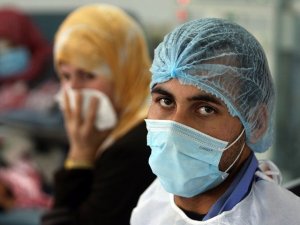
All iLive content is medically reviewed or fact checked to ensure as much factual accuracy as possible.
We have strict sourcing guidelines and only link to reputable media sites, academic research institutions and, whenever possible, medically peer reviewed studies. Note that the numbers in parentheses ([1], [2], etc.) are clickable links to these studies.
If you feel that any of our content is inaccurate, out-of-date, or otherwise questionable, please select it and press Ctrl + Enter.
The world is threatened by a new strain of coronavirus similar to the virus that causes SARS
Last reviewed: 01.07.2025
 ">
">Analysts at the World Health Organization (WHO) are sounding the alarm: a new type of dangerous coronavirus is beginning to spread across southwest Asian and European countries. Every week, the WHO headquarters in Geneva receives information about new cases of infection, fortunately, so far isolated. Nevertheless, as of May 12 this year, according to statistics, 18 people have died from coronavirus (nCoV).
Experts are already convinced that the virus is capable of migrating not only among animals, but also being transmitted from person to person with sufficiently close contact. This was reported to the media at a special press conference by WHO Deputy Director-General Keji Fukuda. It was no coincidence that journalists were gathered in Riyadh, on the Arabian Peninsula. According to biologists, the first infection occurred in the Kingdom of Saudi Arabia. The new type of coronavirus was isolated from a patient who was being treated in the UK. A Qatari citizen, who was in Saudi Arabia shortly before the first severe symptoms appeared, was taken by special flight to a London clinic back in September 2012. A fatal outcome from nCoV had previously been recorded in a 60-year-old citizen of the kingdom, who died of kidney failure in the Netherlands. British doctors compared and confirmed the identity of the DNA of the viruses in both cases. The concern of WHO specialists is related to the fact that the identified type of coronavirus can be transmitted by contact, therefore, its spread can be rapid under certain conditions.
Coronaviruses are a fairly large family of extracellular infectious agents, infection with which at the first stage manifests itself as symptoms of common colds, but then causes a life-threatening condition for the patient - SARS (Severe Acute Respiratory Syndrome or "purple death"). Previously, these viruses were most often detected in animals, since last fall, coronavirus (nCoV) was isolated in human blood serum and tissues. The new strain has a distant similarity to the virus that causes atypical pneumonia, an outbreak of which was recorded in 2002 in China and Hong Kong. The infection then spread to 30 countries, and the last case of atypical pneumonia (SARS) was diagnosed 10 years ago.
In March 2013, the WHO headquarters received information from the R. Koch Institute about a newly diagnosed case of coronavirus infection (nCoV). Again, the patient was a resident of Saudi Arabia, he was urgently taken to a Munich clinic, but the efforts of German doctors for a week were futile, the patient died. A month earlier, a fatal outcome was recorded in the UK in a patient who had visited Pakistan and Saudi Arabia.
As of today, WHO provides information on its official website about 17 officially confirmed cases of the new coronavirus (nCoV), 11 people have died, despite all the efforts of doctors. WHO strongly recommends that all countries strengthen epidemiological surveillance of SARI cases - severe acute respiratory infections and pay more attention to diseases with atypical symptoms and clinical course. Today, specialists from the world organization are closely engaged in joint work with experts from those countries where the majority of coronavirus (nCoV) infections have been registered, namely Saudi Arabia, Qatar, and Jordan. Epidemiological surveillance does not yet imply any restrictions on entry into these countries, but the situation continues to evolve. On May 5, 2013, French specialists reported another case of nCoV disease. This is already the second patient in France diagnosed with the nCoV strain. The person became infected with the virus while in the same ward with an nCoV-infected patient.
